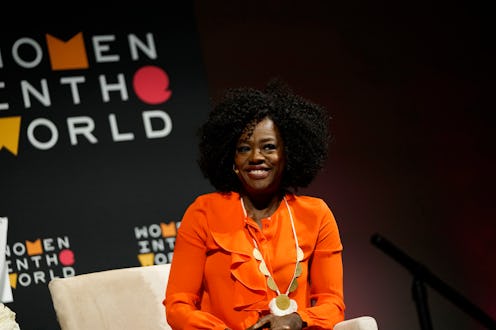Entertainment
Viola Davis' Comments On #MeToo Are SERIOUSLY Moving

On Feb. 13, journalist Tina Brown hosted a slew of strong, notable women for an empowering discussion about an array of timely topics. According to Variety, actress Viola Davis spoke at the Women in the World salon with Brown on Tuesday, and touched on everything from poverty to sexual assault to racial discrimination in Hollywood.
As per the Women in the World's Facebook page, the organization's mission is to "[feature] activists, artists, CEOs, peacemakers, entrepreneurs, and firebrand dissidents... [who have] saved and enriched lives and shattered glass ceilings in every sector." The digital platform was created in collaboration with the New York Times, and "[consists] of vivid journalistic narratives, stirring videos, and provocative discussions and is a premier showcase for women of impact—and for the men who champion them."
After playing a compilation of Davis' most inspirational roles and empowering speeches, Brown sat down one-on-one with the award-winning actress for the conclusion of the salon. Brown began the interview by recalling a moment from the Women's March in Los Angeles on Jan. 20, where Davis addressed the crowd from a podium on stage.
"All of us were just blown away by that speech at the Women's March," Brown told Davis. "In it you said, 'Nothing can be great, unless it costs you something.' What were you thinking when you said those words?" Brown asked.
"Exactly that," Davis replied. "For me, everything has cost me something." In regards to working towards any kind of "progressive change," the actress continued,
I think that people sometimes want to take the safe route... The way life works, it’s gotta cost you something. That’s when you know you’ve really made the sacrifices.
Davis then went on to discuss some of the roadblocks she's encountered, as well as sacrifices she's made in her own life in order to work towards progressive change — both for herself, and for those without voices.
The actress touched on the #MeToo and #TimesUp movements first, and explained that — in order for her to be able to speak to and/or on behalf of the fearful women staying silent — she had to sacrifice her privacy and recount her own personal experiences with sexual assault and harassment.
"Sexual assault is everywhere," she said. "Let's be honest, we've just been waiting for the #MeToo movement, OK? I cannot tell you at any time in my life that I was not sexually assaulted in some way,” Davis later confessed to Brown. "It is so steeped into our culture... and the silence is about the trauma. You leave your body and you compartmentalize that pain."
The two women also discussed the "intense poverty" that Davis experienced growing up in Rhode Island. "I always say that I was a rung lower than poor," Davis explained. After the actress recounted some of the horrific living conditions that she and her family were forced to endure as a result of their poverty, she said,
The reason I always talk about that beginning is because nobody talks about poverty — they don't... Now Trump wants to get rid of food stamps and have these boxes of food delivered to homes where people are poor. It’s because poor people are invisible. I know because I was that. No one looks at you.
Davis later addressed another instance of invisibility — the invisibility she's experienced as a woman of color in Hollywood. "[Studio heads in Hollywood] won’t consider [a woman of color] for a role they wrote for Sandra Bullock or Reese Witherspoon," she said. Instead, according to Davis, women of color are relegated to the roles of "the best friend," or a background character.
In short, Davis explained, studio heads aren't willing to put women of color in lead roles because they're afraid of what it will literally cost them — with advertisers, with certain demographics, with international viewers — they're afraid that women of color won't bring in the same amount of money as non-white women or men.
The Women in the World salon also featured a panel that addressed additional, yet equally-important, modern-day women's issues, and was hosted by Zainab Salbi of PBS's #MeToo, Now What. In attendance for that discussed was Nancy Dubuc, President and CEO of A+E, actress Olivia Munn, Recode founder Kara Swisher, and MSNBC host Joy-Ann Reid. If you missed the livestream on Feb. 13, you can watch the entire salon via Women in the World's website.